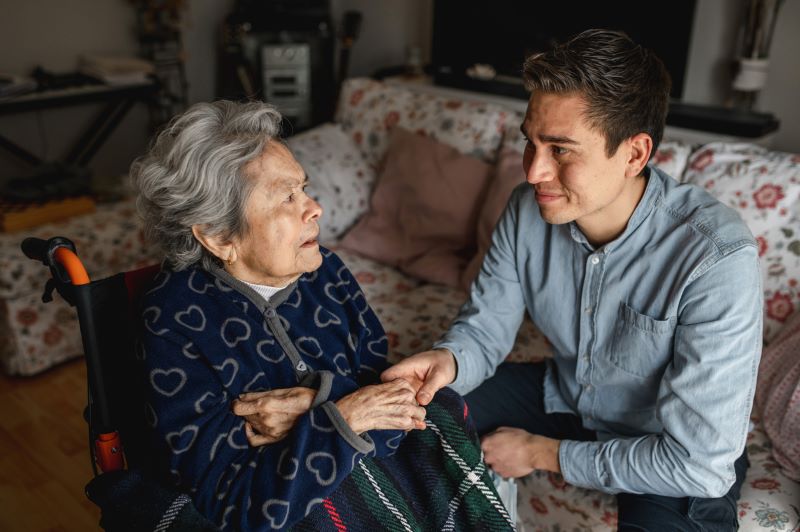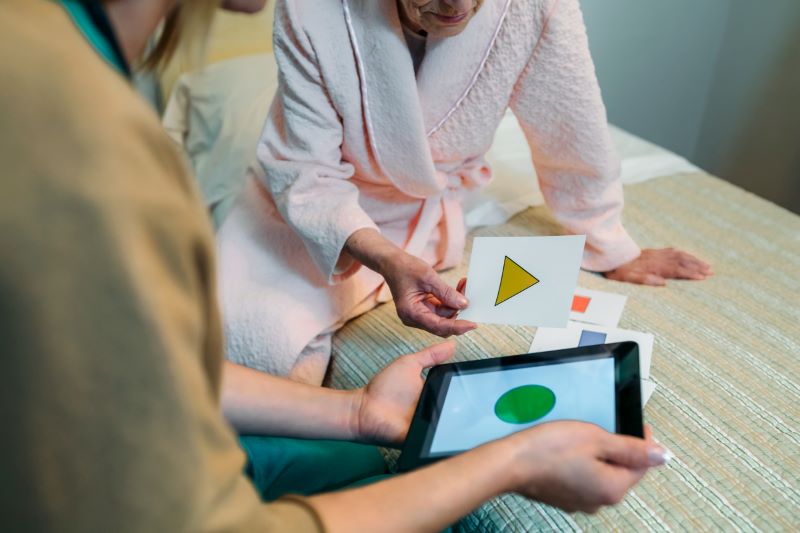Not being able to remember details is a frustrating aspect of aging. Mild forgetfulness happens naturally as people age, but in some cases, it may be a sign of something more serious. Understanding the aging process and learning what to look for can help family members and friends get loved ones essential help and support when they need it most.
Contact the caring professionals at Haven Health to learn how we can help a loved one with memory loss.
What Is Memory Loss?
The National Institute on Aging1 states that mild forgetfulness in older people can occasionally be forgetting a name, slower responses, or misplacing items but then being able to remember those same details later on.
Memory loss due to dementia or Alzheimer’s Disease is more severe and may result in impaired memory, reasoning, judgment, language, and other thinking skills.
Some memory loss may come and go depending on environmental factors (such as lack of sleep or stress). Other times the memory loss remains, and, in some cases, gets worse over time. When this happens, it’s essential to have the right support and care in place for that individual.

What Causes Memory Loss As We Age?
Memory loss is part of the natural aging process. As our bodies age, they begin to function less efficiently, resulting in slower responses or forgetfulness. Some factors that create memory problems as people age include:
- Deterioration – Parts of the brain begin to deteriorate with age. Regions (such as the hippocampus) dealing with memories and information start to function as a slower pace.
- Hormones – Levels of hormones decline with age affecting neurotransmitters in the brain that help memory and concentration.
- Proteins – Proteins in the brain, such as the Arc protein2, begin to break down, affecting memory and brain neuron growth.
- Decreased blood flow – Many studies show circulation to the brain3 is often affected by age—specifically, the temporal lobes—which can cause changes in memory and cognitive skills.
If a family member or loved one is struggling with memory loss, it’s important to speak with a healthcare professional who can evaluate the condition and give care recommendations.
Related: What is Home Care?
What Causes Dementia?
Dementia is due to abnormal brain changes caused by damage to the brain cells. There are many reasons why damage to the brain can occur. Some include:
- Disease – Alzheimer’s Disease, Parkinson’s Disease, Huntington’s Disease, and Frontotemporal Dementia
- Strokes – Brain damage due to strokes can affect memory and lead to conditions such as vascular dementia
- Trauma – Traumatic brain injury, chronic substance abuse, or PTSD can all contribute to cognitive impairment and the onset of dementia
Do you have questions about memory care for a friend or family member? Contact one of our caring professionals today.
Signs of Memory Loss
Noticing loss of memory is a difficult reality to deal with. A certain amount of memory loss happens as we age, but it shouldn’t interfere with activities of daily living (ADLs). Paying attention to signs of memory loss is the first step in determining whether professional memory care is necessary.
Signs of Memory Loss Due to Aging
- Occasionally forgetting which word to use
- Losing an item from time to time
- Missing an appointment or paying a bill
- Difficulty learning and recalling new information
- Not remembering details of an event from years ago
- Slower verbal fluency
Signs of Memory Loss Due to Dementia
- Forgets recent events
- Repeats stories
- Asks the same question multiple times
- Forgets names of close family and friends
- Frequently forgets appointments or events
- Getting lost in a place they know well
- Trouble following recipes or directions
- Not taking care of oneself (bathing or eating)
- Difficulty having a conversation or writing
- Poor judgment
- Changes in mood or personality

Recognizing signs of critical memory loss in loved ones can be difficult to come to terms with. The Alzheimer’s Association4 states that about 6 million people live with Alzheimer’s in the US. The number of seniors living with dementia is quickly growing and is estimated to be 12.7 million by 2050. However, getting the right help as early as possible is vital to living life to the fullest.
If you’re concerned for a loved one with memory loss, contact Haven Health to learn more about our compassionate memory care services.
Progression of Dementia
Unfortunately, the onset of dementia is a reality for an increasing number of people, but no one has to deal with the impact alone. Memory care communities and caring medical professionals can provide options and support if you notice any of these symptoms:
Early Stages of Dementia
The early stage of dementia is more noticeable than mild memory loss due to the severity of symptoms. Medical professionals can assess and determine the next steps if you notice changes in memory or personality. Symptoms may include:
- Forgetting names, words, personal history
- Confusion about where they are or the day of the week
- Moodiness, or changes in personality
- Trouble getting dressed or using the bathroom
- Change in sleep patterns or restlessness at night
- Wandering or getting lost
- Repetitive behaviors
Later Stages of Dementia
The later stages of dementia require around-the-clock care where activities of daily living are provided for and monitored. As cognitive impairment increases, the level of memory care needs to be adjusted to ensure safety and quality of life if the disease progresses.
- Difficulty communicating
- Unable to care for themselves, bathe, or eat
- Unable to remember recent experiences
- Unable to respond to their environment
- Loss of physical abilities, walking, sitting, swallowing, etc.
- Long term memory loss
- Short term memory loss
How To Care for People With Alzheimer’s
Whether caring for someone with dementia at home or working with professionals at a memory care facility, here are some essential tips to keep in mind:
- Stay Calm – Do your best to be patient and understanding. Not being recognized by someone you love is upsetting, but remember not to take it personally.
- Keep it brief – If you need to offer corrections or explanation, keep it short and to the point. Rephrasing comments as suggestions can help the corrections sound less harsh and more likely to be received.
- Indulge in memories – It’s ok to talk about the past. If a loved one believes the past is the present, you can go there with the understanding that it may seem like the present for them.
- Visual cues – Use pictures and items to talk about important family, friends, and places, or create images to identify essential items in their living space, such as a picture of socks outside their sock drawer.
- Talk about it – Find a place to talk about your experience. Utilize in-person or online support groups to get encouragement, advice, and ideas on how to best help yourself and your loved one deal with memory loss.

Support for Family and Caregivers
Managing memory loss due to Alzheimer’s and dementia can be emotionally and physically challenging. Understanding what you can provide and being realistic about when you need support will establish the best quality of life for you and your loved one.
Related: What is Long Term Care?
If you feel that you need more help, memory care facilities can provide the qualified level of care planning to meet the needs and ease the burden of managing any type of dementia.
Contact us today to schedule a tour of one of our Arizona skilled nursing facilities and learn more about the specialized support you need.
Sources:
1National Institute on Aging. (21 October 2020). Memory, Forgetfulness, and Aging: What’s Normal and What’s Not? National Institute on Aging. Retrieved 2 December 2021.
2Bush, Morten. (12 March 2020). Virus-like protein is essential for people’s memory. Science News DK. Retrieved 2 December 2021.
3Cohut, Maria. (9 November 2017). Does blood flow from the heart affect memory? Medical News Today. Retrieved 2 December 2021.
4Alzheimer’s Association. Facts and Figures. Retrieved 2 December 2021.